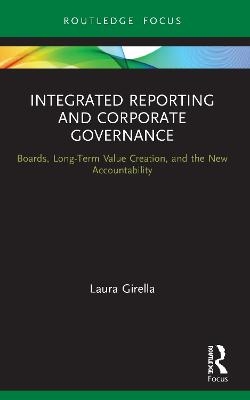
Integrated Reporting and Corporate Governance
Boards, Long-Term Value Creation, and the New Accountability
Seiten
2022
Routledge (Verlag)
978-0-367-69372-5 (ISBN)
Routledge (Verlag)
978-0-367-69372-5 (ISBN)
The aim of the book is to investigate if and to what extent corporate board composition and characteristics can affect, at the same time, the decision to voluntarily adopt integrated reporting by companies as well as their financial performance.
Corporate governance and corporate reporting are closely linked to each other, and their respective evolutionary patterns are mutually influencing. Along with the recent expansion of company disclosure, a growing attention is being paid to corporate governance determinants and mechanisms underpinning the decision to voluntarily adopt non-financial disclosure formats, such as integrated reporting.
At institutional level, several national corporate governance codes have been changed towards the recognition and inclusion of this innovative, non-financial language. In academic research, the influence of corporate governance variables vis-à-vis the choice to embrace such reporting practices has been subject to a long scrutiny. However, only a little inquiry has so far analysed the influence of corporate governance factors on integrated reporting adoption, quality, and credibility.
Accordingly, the aim of the book is to investigate if, and to what extent, corporate board composition and characteristics can affect, at the same time, the decision to voluntarily adopt integrated reporting by companies as well as their financial performance. The study carries out an empirical analysis of the professional features of board members at the time of their decision to implement integrated reporting as a new form of company accountability. The work provides innovative insights into the articulated relationships between the quantitative and qualitative composition of corporate boards and the latter’s choice to uptake this advanced form of reporting to represent the wider value creation processes of their organisations.
Corporate governance and corporate reporting are closely linked to each other, and their respective evolutionary patterns are mutually influencing. Along with the recent expansion of company disclosure, a growing attention is being paid to corporate governance determinants and mechanisms underpinning the decision to voluntarily adopt non-financial disclosure formats, such as integrated reporting.
At institutional level, several national corporate governance codes have been changed towards the recognition and inclusion of this innovative, non-financial language. In academic research, the influence of corporate governance variables vis-à-vis the choice to embrace such reporting practices has been subject to a long scrutiny. However, only a little inquiry has so far analysed the influence of corporate governance factors on integrated reporting adoption, quality, and credibility.
Accordingly, the aim of the book is to investigate if, and to what extent, corporate board composition and characteristics can affect, at the same time, the decision to voluntarily adopt integrated reporting by companies as well as their financial performance. The study carries out an empirical analysis of the professional features of board members at the time of their decision to implement integrated reporting as a new form of company accountability. The work provides innovative insights into the articulated relationships between the quantitative and qualitative composition of corporate boards and the latter’s choice to uptake this advanced form of reporting to represent the wider value creation processes of their organisations.
Laura Girella (PhD, Ferrara) is a Researcher in Business Economics and Accounting at the University of Modena and Reggio Emilia (Italy), and a Technical and Research Manager at the International Integrated Reporting Council (IIRC). She is also a member of the Stakeholder Reporting Committee of the European Accounting Association (EAA).
1. Introduction 2. Corporate governance and integrated reporting: an international perspective 3. Corporate Governance and voluntary disclosure: a review of the literature 4. From theory to practice: board characteristics, financial performance, and the adoption of integrated reporting 5. Conclusion Appendices
| Erscheinungsdatum | 17.08.2022 |
|---|---|
| Reihe/Serie | Routledge Focus on Accounting and Auditing |
| Zusatzinfo | 14 Tables, black and white; 5 Line drawings, black and white; 5 Illustrations, black and white |
| Verlagsort | London |
| Sprache | englisch |
| Maße | 138 x 216 mm |
| Gewicht | 340 g |
| Themenwelt | Wirtschaft ► Betriebswirtschaft / Management ► Marketing / Vertrieb |
| Wirtschaft ► Betriebswirtschaft / Management ► Rechnungswesen / Bilanzen | |
| Wirtschaft ► Betriebswirtschaft / Management ► Unternehmensführung / Management | |
| Wirtschaft ► Volkswirtschaftslehre | |
| ISBN-10 | 0-367-69372-0 / 0367693720 |
| ISBN-13 | 978-0-367-69372-5 / 9780367693725 |
| Zustand | Neuware |
| Haben Sie eine Frage zum Produkt? |
Mehr entdecken
aus dem Bereich
aus dem Bereich
Grundlagen marktorientierter Unternehmensführung : Konzepte, …
Buch (2024)
Springer Gabler (Verlag)
49,99 €
Aufgaben, Werkzeuge und Erfolgsfaktoren
Buch | Softcover (2023)
Vahlen (Verlag)
21,90 €


